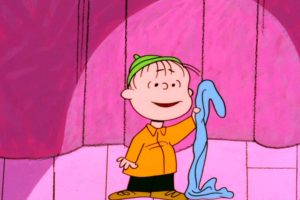Linus, I Need to Hear “The Story” Again
Historian David Hollinger argues that liberal, ecumenical, old-mainline Christianity in the U.S. prepared a sizeable part of the population to shift toward more tolerant and accepting attitudes. He credits moderate-to-liberal Protestant Christianity for remarkable social changes in stances toward birth control, women’s roles, race relations, and acceptance of same-sex marriage and LGBTQ+ persons.
Hollinger’s most recent book, Christianity’s American Fate: How Religion Became more Conservative and Society More Secular, sits on my desk and awaits the holiday break. (In his previous work, Hollinger argued the liberal Christianity’s mark on the culture is much broader and more positive than many leaders and critics assert and deserve more praise and fewer mea culpas.)
If Hollinger is right, which at least for the moment I am going to assume he is, then I wonder how his insight might change what I’ve been thinking about Christmas.
For much of my life, Christmas has been my favorite time of the year. The sounds of classical songs and carols, the smells of vermicelli and shrimp (Christmas Eve), the sight of little ones in darling outfits and lights everywhere, special evenings with family, and raising up the candles on Christmas Eve at the close of Silent Night—I do love these.
 But increasingly, I identify with Charlie Brown searching for the meaning of the season. I’ve written previously about the strategic placement by the early Western church of Christmas on the calendar and the repeated attempts through history to stamp out the bacchanalian and violence-threatening traditions associated with the winter solstice (think “office Christmas party” before “Me-Too” and add a few holstered guns). In the past year or two, I discovered the research, conducted mostly outside the U.S., on Christmas being the worst season of the year for planetary destruction: carbon footprint, manufacture of plastic this and that, detritus burned-landfilled-dumped-in-oceans. The worst country for these practices? The U.S.
But increasingly, I identify with Charlie Brown searching for the meaning of the season. I’ve written previously about the strategic placement by the early Western church of Christmas on the calendar and the repeated attempts through history to stamp out the bacchanalian and violence-threatening traditions associated with the winter solstice (think “office Christmas party” before “Me-Too” and add a few holstered guns). In the past year or two, I discovered the research, conducted mostly outside the U.S., on Christmas being the worst season of the year for planetary destruction: carbon footprint, manufacture of plastic this and that, detritus burned-landfilled-dumped-in-oceans. The worst country for these practices? The U.S.
It is true, Christmas has secular roots that have never been killed. And the way we celebrate Christmas in rich countries, most especially in the U.S., is awful for the planet. Should I succumb to Lucy’s pessimism: Christmas is run, not so much by an Eastern syndicate as she alleged, but by greed parading in the costume of beneficent St. Nick?
But, if I employ Hollinger’s insight, is it possible that in the midst of the secular, commercial, capitalist profiteering of this season, there is yet a live spiritual root also? Consider:
- Would financial giving to many causes be as generous as it is without the spirit of Christmas?
- Would the oft-repeated story of Scrooge, the miserly and bitter rich person whose life was changed in a night (and who gave reparations for the rest of his life), be so popular if we did not have hope for change and redemption?
- There is a tradition of Christmas ceasefires in battle zones. Perhaps killing “the enemy” while marking the birth of the Prince of Peace is too much cognitive dissonance for all but those whose humanity is most damaged.
- All those secular Christmas movies (Home Alone and It’s a Wonderful Life) in which family reunification and the triumph of friendship and love are celebrated—would these themes draw us in again and again if the Spirit of Christmas were truly spent?
- Why can Linus’ recitation, which I’ve watched nearly every one of the last 57 years, still move me to tears of awe and joy?
One could counter that all the above represents Band-Aids bought or applied to wounds inflicted by the very persons, causes, and systems that caused the pain. Maybe. Tolerance is not acceptance. Charity is not justice. Withheld hate is not love. A ceasefire is not peace. One can love every minute of a Christmas Eve service and still be a jerk to relatives the following afternoon.
But why continue to associate these virtues with the Christmas season? Maybe something of the real meaning of Christmas is alive within and underneath all the lights, glitter, and waste. And Linus is the prophet, appearing annually, to proclaim again the why to a forgetful world.
Now, if we could just elevate the virtues and diminish the other stuff.
Gary Peluso-Verdend is president emeritus at Phillips Theological Seminary and is the executive director of the seminary’s Center for Religion in Public Life. The opinions expressed in this blog are those of the author. Learn more about the Center’s work here and about Gary here.


Comments are closed.